CHAPTER III.
DR.
COOK'S OWN STORY.
When
Dr. Cook reached Copenhagen he gave a picturesque and detailed
account of his travels. In fact, he gave it many times, such was the
mad eagerness of learned men and laymen, of kings and men of humble
position, to know all that he had seen and to drink in the wonders of
the North. Cook was like one of the travelers of old who, returning
from a far country to their homes, were beseiged by their friends and
were wont to sit for hours in the great hall of a castle, telling and
retelling the marvels that had befallen.
Perhaps
the best account Cook gave of his dash to the pole was given to W. T.
Stead, the noted London editor and publisher. Stead passed some hours
with Cook and this was what he heard:
"Warning
my Eskimos that only unyielding determination and patience could take
us through the fight against famine and frost and that my success
depended as much upon their loyalty to me as upon myself. I started
for the North Pole on the morning of February 19, with ten men and
103 dogs drawing eleven heavily loaded sledges. Overcoming the
reluctance of my Eskimos to leave the mainland of Greenland by
argument that I would discover new hunting for them across the sound
I marched my party out onto the quivering ice of Smith Sound. We
marched in the dark, the daylight of the Arctic winter's end being
limited to but a few hours. Gloom unrelieved even by the Aurora
surrounded us. Progress was of necessity slow, the piled up ice
forming veritable mountains in our path, over which we had in many
instances to drag dogs and sleighs. The thermometer as we crossed the
sound dropped to 83 degrees below zero, Fahrenheit. On the heights of
Ellesmere Sound we suffered our first losses, several of our dogs
being frozen.
"Game
trails helped us along through Nansen's Sound to the Land's End. Musk
oxen, Arctic hare and polar bears, which were comparatively
plentiful, supplied us with food. It was, of course, necessary to eat
raw meat as our supply of alcohol, the only fuel we carried, was
being kept for extreme emergency. From Land's End we pushed out into
the polar sea on our battle against shifting ice to reach the
southern point of Heilberg Island.
"Here
I established the base for my final effort, selecting the two best
men in my party, Ahweish and Stuckshook, with twenty-six of my
strongest dogs.
"Before
me lay 460 miles of frozen waste broken by ice mountains devoid as
far as we knew of game or anything to sustain life. On our sleds were
supplies sufficient to last us with rigid economy just the distance
we had to traverse and return and no farther. Added to the gloom of
the Arctic night was an overcast sky, making accurate observation for
several days next to impossible. Onward we went, marching along the
level ice, scrambling, pushing, pulling, fighting over the ice hills.
The motion of floating ice could be felt distinctly and served to
frighten my two Eskimos who, however, after a few days' experience
learned to disregard the possible danger of a breakup in open water.
"Straight
on we went, guided mainly by compass, pressure of time and fear of
exhausting supplies, rendering anything like accurate study of
surrounding conditions impossible. On March 30 the atmosphere cleared
a trifle, enabling me to make my first accurate observation, which
showed that we were at latitude 84 degrees 0 minutes 47 seconds and
longitude 86 degrees o minutes 36 seconds. Here I found the last
signs of solid earth. Before us was a moving sea of ice, devoid of
everything living, every trace of anything animal. Neither footprints
of bears, blowholes of seals, nor even traces of the microscope
creatures of the deep could be detected.
"As
we progressed the monotony of the ever moving sea of ice became
almost unbearable. But cold, merciless, penetrating cold, more even
than the object before us, drove us to almost frenzied effort to lay
that sea behind us. Forward we went, lash of duty and merciless drive
of extreme cold spurring us. So day by day we laid off the distance,
dogs and men standing the strain with marvelous fortitude.
"Our
first real glimpse of the sun we obtained on the night of April 7,
when it swung out over the northern ice. Added to our hardships was
the glare of the snow which rendered us almost snow-blind at times.
Sunburn and frostbite attacked us on the same day; dogs were becoming
emaciated from the long march and savage; the patience of my Eskimos
even was beginning to give way under the strain of that daily fight
against the merciless, silent, grim ice. Weary legs scantily rested
by the night's rest were yet eagerly spread over the distance to be
marched for the day, the one impulse of my men apparently being to
conquer and return. On April 8 my observations showed us to be at
latitude 86 degrees 0 minutes 36 seconds, longitude 94 degrees 0
minutes 2 seconds. Less than 100 miles in nine days.
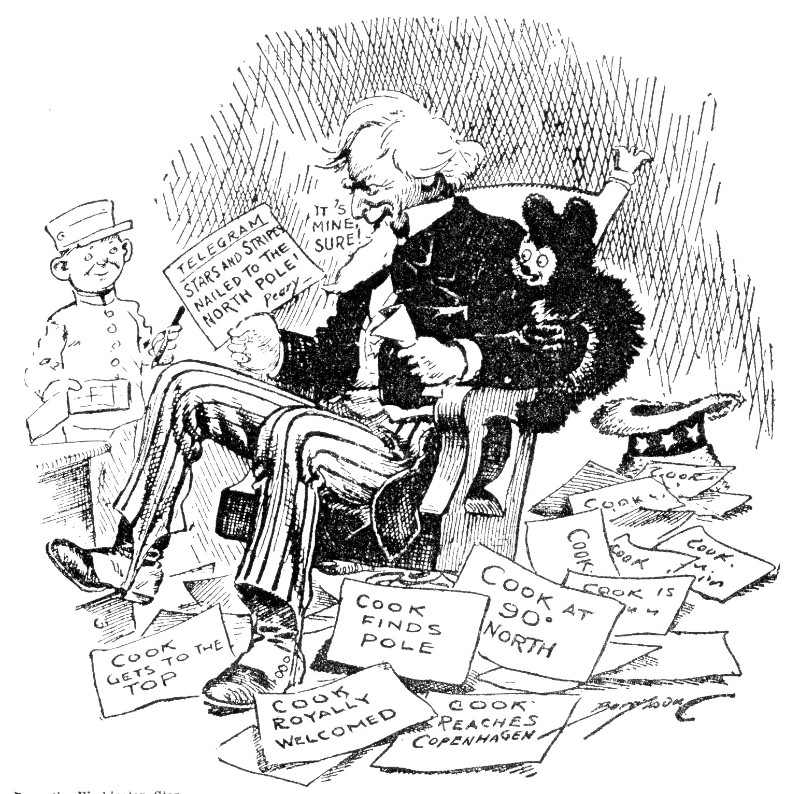
From the Washington Star
"Circuitous
twists around ice hills too high to be conquered, troublesome
pressure lines and old ice dangerous to our dogs and the men
themselves forced us to lose much valuable time.
"Hasty
stock-taking convinced me that we must push forward and make our
distance within fourteen days or return with our goal unconquered.
Eastward the ice drift began to take us rapidly and with force that
caused me the greatest anxiety. Still 200 miles from the pole and
fourteen days the absolute limit in which to conquer that distance.
But from here on our troubles began to diminish.
"The
ice fields became more regular. Fewer crevices, with little crushed
or old ice, made our progress astonishingly rapid. From the
eighty-seventh to the eighty-eighth latitude, much to our surprise,
we found signs of land. Positive evidence, however, was lacking. In
fact, I knew not whether we were marching on land or sea.
"On
the 14th I took another observation. Our position was shown as
latitude 88 degrees 21 minutes and longitude 95 degrees 52 minutes.
Less than 100 miles from the goal. Again the over-weary dogs were
lashed into action. Once more our weary legs took up the march. Less
than 100 miles to go, and still a quick calculation showed me enough
provisions if we did it in six days.
"Our
speed became a veritable race. The time was at hand for the last
mustering of every energy. The goal was too near to be lost now. Snow
shelters we gave up. We were too weary at the end of our marches to
erect them. Huddled together, our dogs the same, we rested when weary
and marched whenever possible. We tried our silk tent and found it
served to shelter us perceptibly from the bitter cold. I imagined
that I saw signs of land every day, but could not trust my senses
under the strain. Onward we pushed, our horizon ever monotonous,
uncrossed now by cloud or indeed anything. Mirages when the sun shone
turned the world topsy-turvy. Observations were made at every step to
guide us accurately.
"Steadily
the ice improved until we appeared to be moving almost on a level
glacial sea. Slower, despite frantic effort and ever growing
impatience, our pace again became. The terrific speed of the past
hours I saw clearly could not be maintained, but to try to stop my
men appeared to be useless. Rest had become a farce to us. Even the
dogs appeared impatient at the enforced stops. April 21 I stopped the
party and prepared to take an observation. Rough calculation told me
that I must be somewhere in the vicinity of the point I was seeking.
I found that our latitude was 89 degrees 57 minutes 46 seconds. The
North Pole was within sight!
"Fourteen
seconds more we advanced slowly, almost painfully. The anxiety was
terrible. Again, to make sure, I took an observation by the sun. It
was correct. Our latitude was exactly 89 degrees 58 minutes. Forward
again we went, taking observations every few seconds. Finally we
stopped. I believed I had reached the goal. Again, almost
tremblingly, I took an observation. There was no mistake. A series of
circular observations around the place where we temporarily halted
proved me to be at the point.
"The
North Pole was conquered!
"Conquered
and in the nick of time, for our provisions even at the most
economical calculation could not have lasted us had the northern
march taken three days more. Forty-eight hours we remained in the
vicinity of the lonely, cheerless spot, the goal of the explorers'
ambition for centuries. I rested the men and dogs as much as possible
in the dreary, chilly waste. Rest for me was impossible. The
knowledge of the final conquest kept me in almost constant activity.
April 23 I ordered the return.
"Our
return journey, although marked by more hardship than our advance to
the North, was nevertheless made lighter by the joy of duty
accomplished. Although we were forced to kill several of our dogs for
food and finally allowed those still living to run loose at the spot
where we crossed the Firth of Devon into Jones Sound, we took our
misfortunes more or less cheerfully and at Cape Sparbo, which we
reached in September, we built an underground den and remained there
until the sunrise of 1909, living on game killed with crude
instruments and waiting patiently until the new day could take us
back to tell the world of our triumph.
"February
18 the new start was made for Annootok. April 15 we reached the
Greenland shores again. The rest the world knows."
Mr.
Stead adds by way of comment:
"In
surveying Dr. Cook's story it will be well to remember that all the
hardships, the hair-breadth escapes, all the famine and the imminent
prospects of death occurred not in the rush to the pole but on his
return journey, especially in the last six months of his journeying.
"Public
attention has been riveted upon his dash to the pole across the
frozen Polar Sea. But that was with him, as with Peary, a
comparatively swift, uneventful advance, kept up day after day at the
rate of fifteen miles daily.
"If
the western drift of ice had not carried him out of reach of the game
lands at Herbert Island he would in all probability have been back
twelve months earlier. The real hardships of Dr. Cook began not in
high, but comparatively low latitudes.
"He
has a far vivider recollection of the stirring events occurring last
winter than of the comparatively monotonous rush to the pole. He sees
this polar journey at the end of a long vista of fifteen months,
which were crowded with such stirring episodes, filled with such
wearing exertion that — as he told me — it seemed as though all
the cells of his body and brain were burned out and replaced in the
fire of that strenuous life.
Click Map for Larger Image
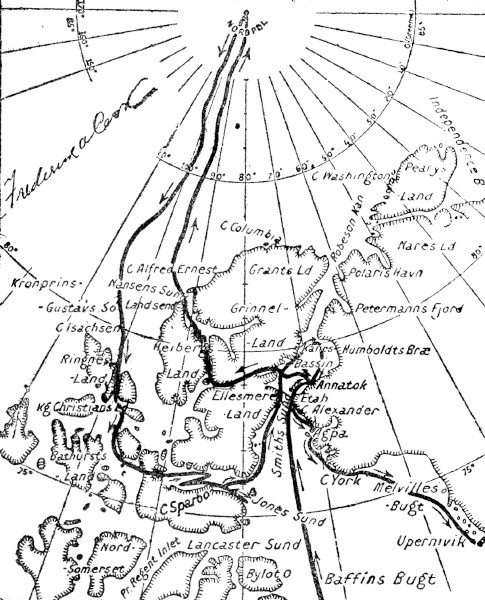
MAP DRAWN AND SIGNED BY DR. COOK, SHOWING HIS ROUTE TO AND
FROM
THE NORTH POLE. HIS AUTOGRAPH APPEARS IN THE UPPER LEFT CORNER.
"One
thing stands out conspicuous — that this American citizen never
discredited his country by any high falutin vulgarity or ungenerous
caviling against any brother explorer.
He
impressed every one, from the King of Denmark down, as a
simpleminded, honest man, not a bit of a bounder. I believe him to be
absolutely unprovided by nature with the necessary outfit of a fakir.
"Cook
himself is certain that he got to the pole. He has a certainty that
is as calm, as immutable, as the great pyramids."
A
DIPLOMAT'S TRIBUTE TO DR. COOK.
Dr.
Maurice Francis Egan, American Minister to Denmark, in a magazine
article written shortly after Dr. Cook's return to the United States,
tells in a straightforward way why he believes implicitly in Dr.
Cook, and narrates interestingly some of his experiences with Dr.
Cook in Copenhagen immediately following the explorer's return from
the North Pole.
Dr.
Egan had been prepared for the complete acceptance of Dr. Cook's
story, which he now expresses, by the attitude of the Danes
themselves, who relied upon the testimony of those who vouched for
the intrepid traveler as much as upon his own, in view of their
especial qualification for judging the veracity of anything that
comes out of the frozen North. In the course of his introduction,
leading up to the receipt in Copenhagen of the two cablegrams
announcing Dr. Cook's discovery, Dr. Egan says:
"The
people of Scandinavia are natural explorers. One cannot teach an Arab
anything about the desert, and it would be a very audacious man who
from southern regions would attempt to give lessons to a Dane or a
Norwegian on the lands that lie above him or seas that lie beyond
him. These people know by the instinct of long heredity, by constant
study of the maps of Greenland and of the unknown lands of the waters
that are lost in mist, the ways of the frozen North. They know the
ins and outs of Arctic warfare as we know the character of the
various States in our Union. To a Dane, Greenland, Iceland and the
land which Cook has seen are subjects of perpetual interest. They are
always looking toward the North, and expecting news from the
mysterious North, and the sojourner among these people so learns to
think and talk of the North and to be intensely interested in it. * *
*
"Now
the Danish officials in Greenland are cautious folk. They are not
easily moved to praise or blame. And on matters concerning the north
and the pole they are scrupulously conservative. No emotion, no
sensation moves them. They do not see the pole through the mirage of
the south. When I noticed the signature to their telegrams I felt
that they meant much.
"Here
was a plain statement of a fact as stupendous as the first words
Columbus uttered, to express the truth that he had added a new world
to Leon and Castile. The news soon spread through Copenhagen, which
had heard great news of Peary and Nansen before. The town was stirred
as if Holger Dansker had risen from beneath the vaults of Kronborg
Castle — the castle of Elsinore — and walked into the streets.
Nobody questioned the truth of the story, for Knud Rasmussen's name
is a talisman, and the officers in Greenland do not take travelers'
tales seriously unless the travelers have serious claims.
"Later
came testimony from the great Norwegian explorer Amundsen and from
Captain Otto Sverdrup; and then the time of waiting. Even the boys in
the street were waiting for Cook. A new Danish joke began to
circulate. 'Do you believe that the cuckoo can prophesy?' 'Yes; once
in the spring, I asked who should be first at the North Pole and it
said, "Cook, Cook, Cook." '
CHILDREN
TOOK OFF CAPS.
"The
other day Dr. Cook drove with me through the streets of Copenhagen
and along the Strandvej to Charlottenlund, one of the summer palaces
of the King; even the little children waved their hands and took off
their caps. If he had been an explorer crowned with the laurels won
by the discovery of the South Pole, he would not have been so
interesting to these little people, but he came from a country which
they had heard about from the moment that they could hear at all —
a country which is very near to them. * * *
"Coming,
ardently expected, was a hero whom they could understand, and he
needed no explanation. That he was approved of by Knud Rasmussen,
half an Eskimo himself, who knows all the ways of the Eskimo, to whom
the snow and ice are as the forest bark and leaves are to our
Indians, was enough.
"To
me, knowing Dr. Cook through his articles in the Century and
Harper's, and through his entrancing 'First Antarctic Night,' it was
a great pleasure to think of his coming, and to believe that he had
added a new glory to Old Glory."
"How
Cook Came and Went" is the title of Dr. Egan's articles, and he
deals with details much more fully than have the cables. Coming down
to the morning of Dr. Cook's arrival in Copenhagen, he continues:
"When
I reached the environs of the harbor my coachmen would have found it
impossible to get near the open space reserved for members of the
Royal Geographical Society if it had not been for their red, white
and blue cockades, for which a passage was instantly made. The Crown
Prince was in position and tremendously interested. Near him was
Commodore Hovgaard, commander of the King's yacht, to whom the
success of the ceremonies attending the reception of Dr. Cook is
largely due.
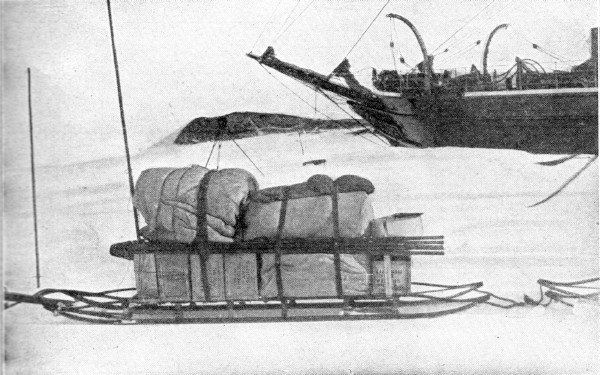
COOK'S SLED PACKED READY FOR THE DASH TO THE POLE.
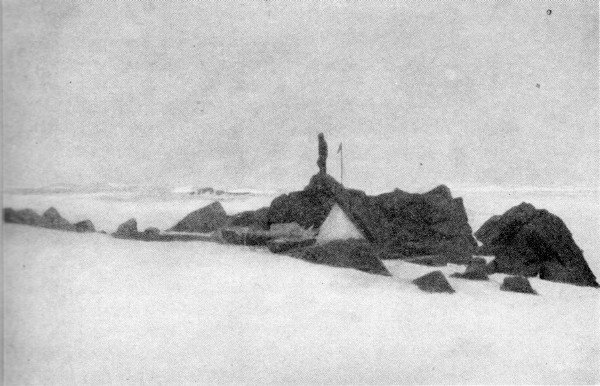
PEARY'S WINTER QUARTERS -- THE LOOKOUT
WATCHING THE RETURN OF THE SLEDGE PARTY.
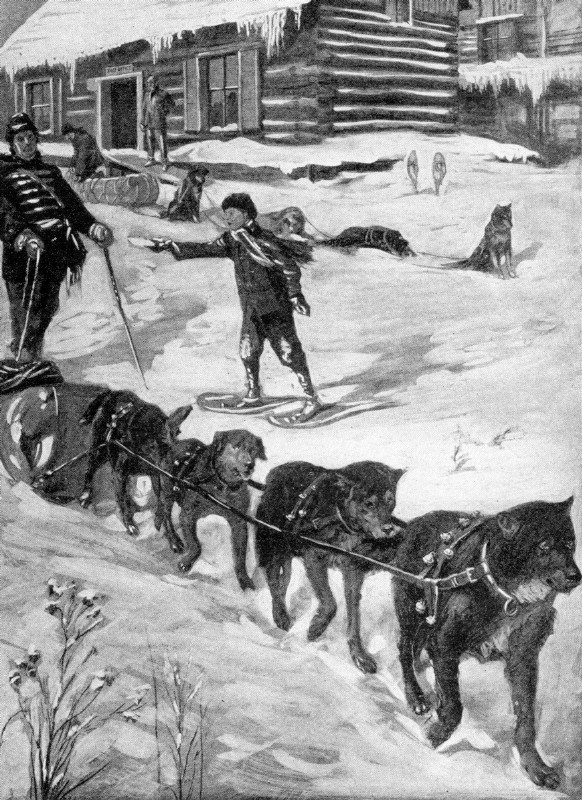
TRAINING ESKIMO DOGS FOR THE PEARY EXPEDITION.
"It
was a beautiful morning; the Sound never looked bluer or seemed to be
more brilliantly flecked with silver spots. The crowd increased and I
began to know what pain a President had to suffer under the process
of congratulatory hand-shaking. The Crown Prince had an engagement to
preside at the laying of the cornerstone of a students' building at
ten o'clock. He is most punctual. When he goes to a ceremonious
convention himself he is always there at the exact time. When his
father, the King, goes he is invariably there five minutes before the
time. We still waited. The Crown Prince concluded that the students
would not be impatient, because they had the habit of taking 'the
academical quarter of an hour.' At last the Hans Egede appeared. The
expectancy of the great crowd grew intense and expressed itself in
silence.
"The
Crown Prince and the representatives of the Royal Geographical
Society and myself entered the launch. In a short time we were on the
deck of the Hans Egede.
PRINCE
GREETS HIM.
"Doctor
Cook, not by any means then the glittering butterfly of fashion into
which a tailor later in the morning transformed him, stood at the
head of the ladder. Prince Christian greeted him first; then I came.
He smiled: — 'You are the first American I have shaken hands with
for over two years,' he said. Afterward he explained, with that
careful regard for exact truth which is his characteristic, that he
had in the meantime shaken hands with Mr. Whitney, but that he looked
so much like an Eskimo that, for the moment, Doctor Cook had
forgotten his nationality.
"The
explorer in his rough and weather-beaten clothes, resembled somewhat
the familiar figure of Robinson Crusoe. Prince Valdemar, the Premier
Admiral of the Danish navy stood near him and most enthusiastically
congratulated the American people, through me, on this new glory to
the American flag. The thing after we landed was to know how to get
to our carriages.
"The
Crown Prince, through the cleverness of his Chamberlain, got safely
into his automobile, but Dr. Cook and Mr. W. T. Stead, whom I had
invited to share my carriage, were with myself pinned tight in the
enthusiastic, happy and energetic crowd. Dr. Cook had his sea legs
on, which in a crowd are not nearly so good as land legs; he had been
so used to the swaying deck that the solid soil was new to him. Mr.
Stead took him in his arms, held him tight and began to interview him
at once.
"It
took at least ten minutes to be propelled through a sea of applauding
and hand shaking people. I owe it entirely to the honesty of a
Copenhagen tailor that my coat tails were not torn off and that I was
lifted up the steps of the home of the Geographical Society with no
loss except one button. I am afraid that if the aegis of the United
States had not been upon me, which was both a halo and a nimbus on
this day, at least one of my ribs would have been broken. The
adventure recalled a Georgetown football game on Thanksgiving Day.
"Dr.
Cook was forced to make a little speech, and then, led by a private
way, he finally reached his hotel. There was to be no rest for him,
however. Knowing this, I arranged that he should come to the Legation
to lunch in quietness.
THE
DANISH FAREWELL.
"When
he left Copenhagen on the afternoon of the tenth, on his way to meet
the Scandinavian-American liner Oscar II," Dr. Egan writes, "he
was the center of admiring throngs. Among those last to say farewell
was Count Christian Holstein-Ledreborg, the son of the Prime
Minister, sent by his father to see him off.
"Flowers
were showered upon him. Old men and women asked to clasp his hand,
and at that moment he was the hero of this nation of Vikings. His
speeches on receiving the very high honor of the Royal Danish
Geographical Society's medal and on being made an honorary Doctor of
Philosophy in the University of Copenhagen were brief, direct and
simple. This university knows perfectly well how to blend in its
functions solemnity, simplicity and brevity. None of these functions
ever occurs without music forming part of it, and a great part, and
the cantata for an orchestra of stringed instruments which preceded
the short speeches was an admirable preparation for them.
"On
Friday, when he left, he was loaded with honors and followed by the
acclamations of the people. He stood for a few moments on the upper
deck of the Melchior. Admiral de Richelieu had toasted him, the
center of a crowd in the cabin; but now he stood alone, and the
cheers that greeted him were as much a tribute to his personal
character as to his epoch making exploit. Kindly, simple, firm and
sincere, he had in a short time made the sons of the Viking's love
him."
|

